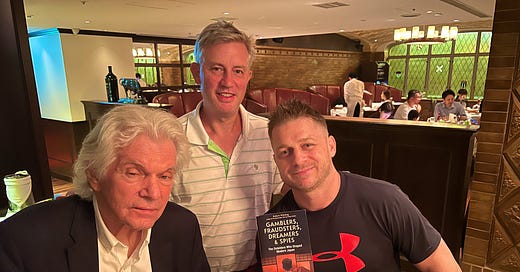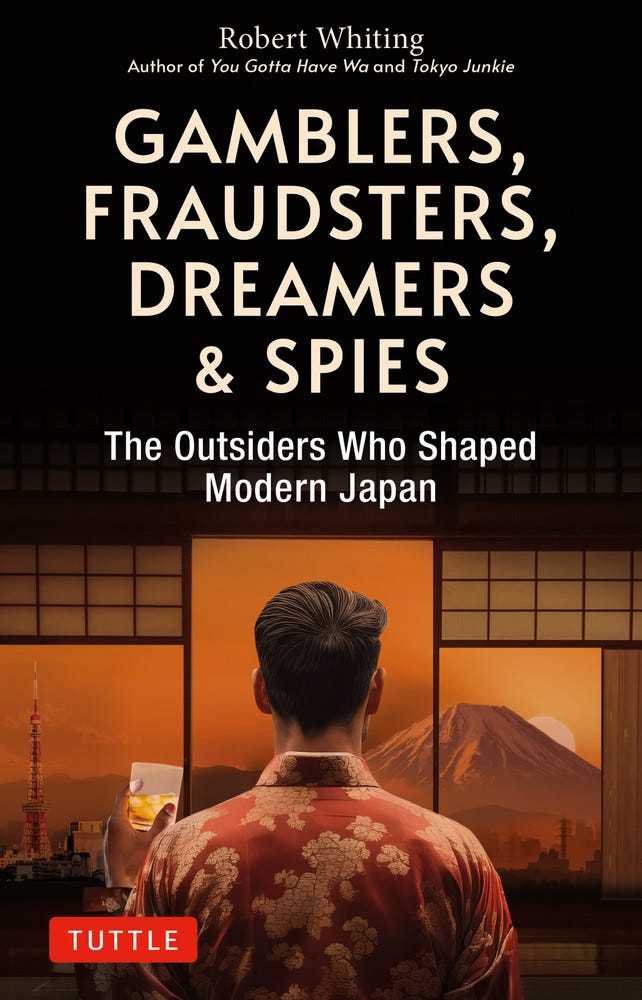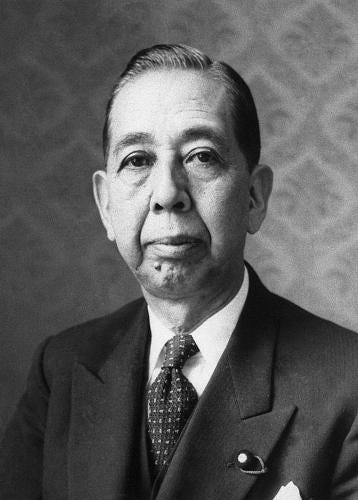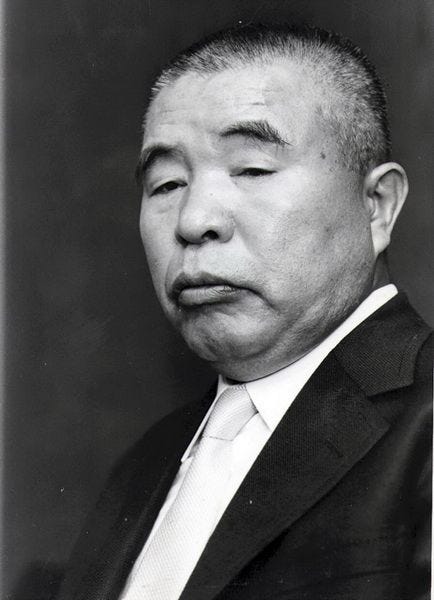Tonight I went to dinner with my good friend Robert Whiting, one of the greatest non-fictional authors of modern times, and a new friend Trevor. You have to pick up Bob’s books and read!
Whilst reading Bob’s latest book, “Gamblers, Fraudsters, Dreamers & Spies: The Outsiders Who Shaped Modern Japan” I came across the name Clyde McAvoy. In all my time in Japan I’ve never met a single McAvoy here (not to say there isn’t one!) so to see this name was intriguing. Before I tell you about Clyde though, you’ll need to know some historical context.
In “Gamblers, Fraudsters, Dreamers & Spies: The Outsiders Who Shaped Modern Japan” there is a chapter on The Unification Church, commonly known as the "Moonies," who are a controversial religious movement founded by Sun Myung Moon in South Korea in 1954. The group combines elements of Christianity with Moon's own cult like teachings, emphasising the importance of "true families" and mass weddings. Despite its message of peace and unification, the church has faced accusations of being a cult, with critics citing manipulative recruitment tactics and financial exploitation of members. They are said to be responsible for helping George W. Bush win several key elections on his way to becoming President in 2000 and Moon himself bragged that Bush got the top job because of him. With millions of loyal followers and an empire of wealth, it wouldn’t be hard for them to do.
In Japan, the Unification Church gained a foothold into the country through its connection to former Prime Minister Nobusuke Kishi.
Kishi, grandfather of another former PM Shinzo Abe (who was assassinated in July of 2022), helped establish the Japanese branch of the church's anti-communist organization in the 1960s. This political alliance provided the Moonies with credibility and influence in Japan, where the group has since faced scrutiny for aggressive fundraising practices and its impact on members' families. Their fundraising goal was said to be $200 million per year and to get that much money they would guilt Japanese people into donating, saying their ancestors were suffering in hell for their war time sins against Koreans and that the living relatives had to pay. 80% of worldwide Moonie donations came from Japan it is said.
Kishi’s grandson Shinzo Abe was delivering a campaign speech for a Liberal Democratic Party candidate in July of 2022 when he was fatally shot by 41-year-old Tetsuya Yamagami with a homemade gun, who claimed that the Moonies had taken a million US dollars from his mother and ruined the family forever. Abe had recently given a congratulatory video message to the church and Yamagami got his revenge and then some.
But what about Clyde McAvoy?
It’s still not time to talk about Clyde yet! A little bit more historical context is needed. You know who the Moonies are now (massive cult with lots of money that supported LDP politicians in Japan and republicans in the U.S. - making sure they got elected). They also founded and bankrolled The Washington Times - a conservative newspaper to counter the liberal newspaper The Washington Post. The Times was Ronald Reagan’s paper of choice and endorsed by George Bush senior.
Where does Kishi come in to this story other than helping bring the Moonies into Japan?
In the 1950’s and 1960’s. The entire world was scared of the communist threat. Japan had been destined to become a socialist country after the Americans occupied the country but Communism changed that. The threat of Russia and North Korea, as well as Mao in China, meant that Japan needed to become a conservative right leaning nation instead.
To cut a long story short, in order to achieve that, several war criminals locked up in jail were released and given the task of changing Japan. One of those was Nobusuke Kishi (pictured above), a man who married his first cousin. Another key figure was Yoshio Kodama who I’ve written about before on this substack.
Who was Yoshio Kodama?
One person that absolutely fascinates me is a guy called Yoshio Kodama and as a filmmaker, I intend to one day make a film with him as one of central characters! I first read about Yoshio Kodama in Robert Whiting’s amazing book Tokyo Underworld: The Fast Times and Hard Life of an American Gangster in Japan
Nobusuke Kishi's journey from being a war criminal to serving as Japan's Prime Minister, and ultimately to his death, is a complex and multifaceted tale that reflects the tumultuous history of Japan in the 20th century.
Before World War II, he played a significant role in Japan's industrial and economic policies, particularly in Japan occupied China Manchuria, where he was involved in the administration of the puppet state established by Japan.
During World War II, Kishi served as Vice Minister of Munitions and later as Minister of Commerce and Industry. In these roles, he was responsible for overseeing Japan's war production efforts, which included the use of forced labor from occupied territories.
After Japan's surrender in 1945, Kishi was arrested by the Allied Occupation authorities as a suspected Class A war criminal due to his involvement in Japan's wartime government. He was imprisoned at Sugamo Prison from 1945 to 1948 but in 1948, amidst the rising Cold War tensions and the U.S.'s desire to have a stable and strong Japan as an ally against communism, Kishi was released without trial. His release was part of a broader shift in U.S. policy that sought to reintegrate former wartime leaders who were seen as capable of contributing to Japan's economic recovery and anti-communist stance.
For a year before becoming Prime Minister, Kishi met in secret with CIA and State Department officials. The talks laid the groundwork for the next forty years of Japan’s relations with the United States. Kishi told the Americans that his strategy was to wreck the current ruling Liberal Party, rename it, rebuild it, and run it. The new Liberal Democratic Party under his command would be “neither liberal nor democratic, but a right-wing club of feudal leaders rising from the ashes of imperial Japan.”
He pledged to change the foreign policies of Japan to fit American desires. The United States could keep its military bases in Japan and store nuclear weapons there, a matter of some sensitivity in Japan. All he asked in return was secret political support from America.
NOW we can talk about Clyde McAvoy!!
In November of 1955, Kishi succeeded with the help of the US, as Japan’s conservatives all came together under the banner of the Liberal Democratic Party. As the party’s leader, Kishi allowed the CIA to recruit and run his political followers on a seat-by-seat basis in the Japanese parliament. This LDP were receiving ONE MILLION US DOLLARS per month from the CIA to keep them in power, good for about 12 million a month in today’s money. The money was sent from Washington via different American business men and Kishi’s case agent was Clyde McAvoy, a Tokyo based CIA agent.
Clyde McAvoy, is able to report on (and influence) the emerging foreign policy of postwar Japan. Pretty big part of history!
The CIA also helped establish the KCIA - Korean version of the CIA and the KCIA and the Moonies always worked hand in hand.
As Prime Minister, Kishi is best known for his efforts to revise the Japan-U.S. Security Treaty, which he saw as necessary to solidify Japan's defense relationship with the United States. The revised treaty, signed in 1960, extended the U.S. military presence in Japan and committed the U.S. to defend Japan in the event of an attack. However, the treaty was deeply unpopular among many Japanese citizens, leading to massive protests and civil unrest. The largest protests, known as the Anpo Protests, culminated in violent clashes and a political crisis.
The CIA didn’t care, they had their hands in the LDP pie and Japan was being run the way they wanted - and Clyde McAvoy was right there in the mix of it! Unfortunately not a relation of mine but still a pretty cool story.
Rionne McAvoy is the director of the award-winning documentary The One's Left Behind: The Plight of Single Mothers in Japan, showcasing his dedication to addressing pressing social issues. A committed documentary filmmaker and professional wrestler, he explores critical themes with passion and insight. Additionally, he has a keen interest in post-World War II Japan, particularly the intricate connections between politicians and gangsters during that era. Known in the wrestling ring as Rionne Fujiwara, he brings the same determination and storytelling prowess from his wrestling persona to his filmmaking endeavors.








Wow! That’s really cool!